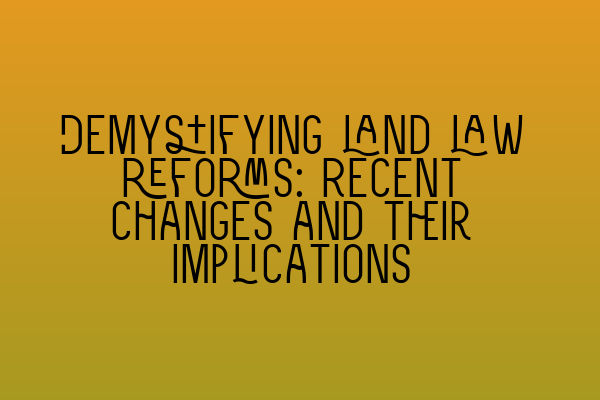Demystifying Land Law Reforms: Recent Changes and Their Implications
Welcome to the SQE Property Law & Land Law blog, your go-to resource for all things property and land law related. Today, we will be demystifying recent land law reforms and exploring their implications on property transactions and land ownership.
The Changing Landscape of Land Law
Land law is an ever-evolving field, constantly adapting to the needs and demands of a changing society. In recent years, we have seen significant reforms that have reshaped the way property is acquired, owned, and transferred.
One such reform is the introduction of the Electronic Communications Code, which has had a profound impact on how telecommunications infrastructure is installed and maintained on private land. This has raised several legal challenges for property owners and network operators alike. To delve deeper into these challenges, check out our comprehensive guide on Legal challenges in property transactions.
Another noteworthy reform is the Land Registration Act, which has revolutionized the process of registering land ownership and interests. By shifting from a deeds-based system to a registered title system, the Act aims to provide greater transparency and security in property transactions. However, this transition has not been without its pitfalls. To avoid common pitfalls and dominate property law questions related to land registration, read our informative article on avoiding common pitfalls.
Implications for Property Transactions
These reforms have significant implications for property transactions, affecting both buyers and sellers. With the Electronic Communications Code, property owners must now navigate legal challenges related to access, compensation, and termination of telecom leases. Similarly, the Land Registration Act introduces new requirements for registering and transferring land ownership, ensuring that all interests and charges are properly recorded.
It is crucial for property practitioners to be well-versed in these reforms and their implications. Understanding the intricacies of the Electronic Communications Code and the Land Registration Act can mean the difference between a smooth property transaction and a legal dispute. To ace your exam preparation and revise effectively for land law, check out our helpful article on Land Law Revision Tips.
Sustainability and Development
As society becomes increasingly aware of the need for sustainable development, land law has also been impacted by environmental ethics. Balancing the interests of development and sustainability can be a complex task, requiring careful consideration of planning regulations and environmental assessments. To explore this topic further, our insightful article on Environmental Ethics in Land Law provides a comprehensive analysis of the challenges involved.
Real-World Scenarios
Finally, it is important to apply legal knowledge to real-world scenarios to truly understand its practical implications. Our SQE case studies in property law provide a collection of real-life scenarios that property practitioners may encounter. By delving into these case studies, you can gain a deeper understanding of how land law operates in practice and develop the skills needed to navigate complex legal issues. Read our fascinating case studies on SQE case studies in property law.
Conclusion
Land law reforms have reshaped the legal landscape, bringing about both challenges and opportunities for property practitioners. By staying up to date with the latest changes and understanding their implications, solicitors can better serve their clients and navigate complex property transactions with confidence. To master property and land law, explore our range of articles and resources, and take your legal knowledge to new heights!
